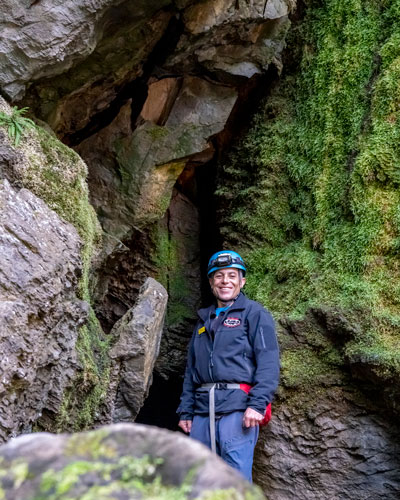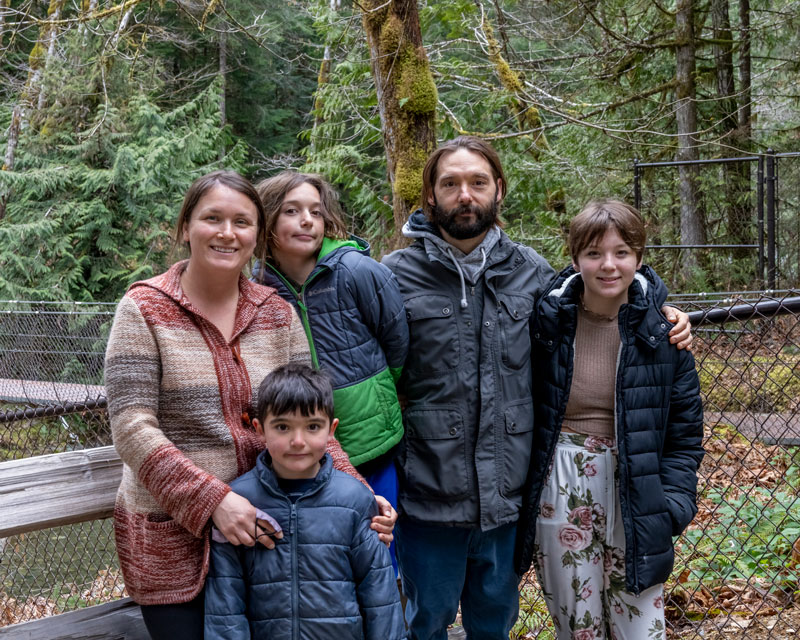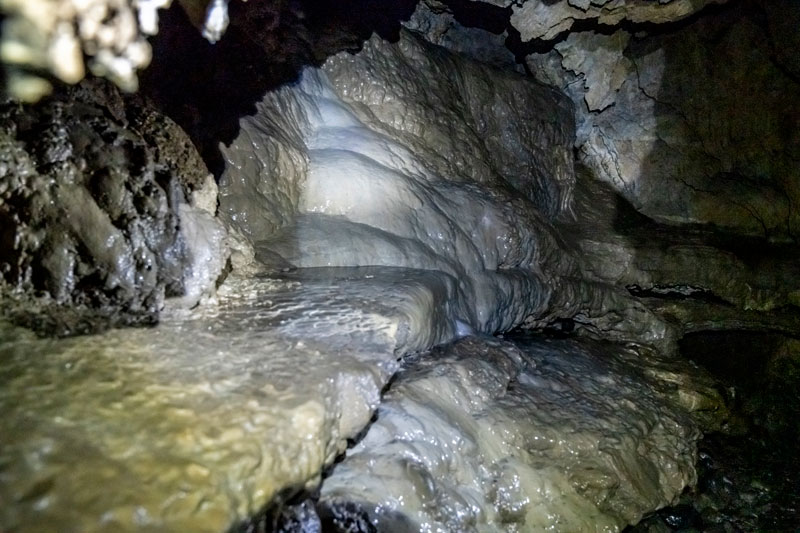By Lissa Alexander
Photos by Brian Argyle
Richard Varela feels like caves today are akin to whales in the early twentieth century.
“You could go out and harpoon the whale and drag it into the bay to a cheering crowd,” he says. “But then they started to protect whales.”
Richard, Park Director at Horne Lake Caves, has been taking people through the Caves for 31 years. That’s when he signed a contract with BC Parks to manage the incredibly diverse provincial park located in central Vancouver Island.
Since that time, his company’s mission has been to promote cave conservation and educate people on just how spectacular the Caves are.
“They are these amazing repositories of fossils and bone beds and seed and pollen data from the last ice age,” he explains. “It’s all pressed into the mud wall.”
Rappelling waterfalls
Originally from New York City, Richard moved to Courtenay with his family when he was 11 years old. His brother, who is 20 years older than he is, moved to Vancouver to dodge the Vietnam War draft. When he and his parents went to Vancouver for a visit, they decided to move to B.C. They sold their chain of 7-Eleven stores in New York and bought a small grocery store in Courtenay in 1972.
Soon after relocating, Richard met some great friends who took him skiing on Forbidden Plateau, hiking in the local mountains, and swimming in the lakes, rivers and ocean.
“This was obviously the most wild and natural playground if you were in to the outdoors,” he says, “and it seemed crazy to me that no one was making a business of it.”
Richard worked at the Campbell River Airport where he heard stories of rappelling down waterfalls inside of caves and paddling across underground lakes. His interest was piqued and he began exploring the plethora of caves on Vancouver Island.
Deep mysteries
In 1988, he and two friends started Island Pacific Adventures. It was originally a marine focused business, with charter fishing and scuba diving tours, as that was his partner’s area of expertise. Richard preferred land-based adventures and got permits from BC Parks to do guided tours to the Comox Glacier, Mount Albert Edward and Della Falls.
“Adventure tourism and eco-tourism: these phrases hadn’t been coined yet,” he reveals. “You could count the number of adventure companies in B.C. on one hand back in the late ‘80s.”
When Richard was applying for a permit with BC Parks, an employee saw that he had assisted school groups at Horne Lake Caves. He revealed to Richard that B.C. Parks would soon be contracting out its parks, and was impressed with Richard’s resume. Richard put together a proposal and in 1990, became the next caretaker of Horne Lake Caves Provincial Park. The Park is celebrating 50 years as a Class A Provincial Park this year.
Richard turned his attention solely to the Caves at that point, bought out his partners and got to work. As the park’s caretaker, Richard is responsible for all the needs and associated costs related to the Caves.
“We do all the grading, the raking, the painting, the staining, the signage, we do it all. It costs the Province nothing, and we manage it and insure it and occupy it — and blow people away with these guided tours.”
There are a variety of different tours available, where people get to learn about the deep mysteries of the Caves, glean some geologic history about our region, and view some features that you can’t see anywhere else. This includes calcite crystal formations, fossils, underground waterfalls and large chambers.
The Byrne family toured the Caves during Spring Break. Sean and Ellen Byrne, and their children Declan (6), Elliot (10) and Daya (13) have visited caves in Malaysia, Vietnam and Thailand, but this experience really stood out to them.
“This was definitely less travelled,” says Ellen as she and her family recount their morning adventure. Sean agrees.
“This was much more natural,” he clarifies. “In Asia everything is lit up, there’s shrines everywhere and huge groups of people.”
Sean says his favourite feature is a pond that acts like a mirror with a natural formation that resembles a Buddha. Elliott likes the water droplets on the cave ceiling.
“The water made it look like diamonds when you were looking up,” Sean explains.
Daya and Ellen are very taken with the calcite formations, Declan says he likes the small spaces, and Daya reveals that it’s nice to get out on an adventure after having to be at home for so long.
Raising the bar
Richard and his team have won countless awards over the years, including the inaugural Remarkable Experiences Award from Destination BC, and the Raising the Bar award from Tourism Vancouver Island.
There are seven caves in Horne Lake Caves Provincial Park, and usually Richard and his team take guests into three of them. But COVID-19 has taken its toll on the business, and they have closed one of the caves because of the close contact required.
In March 2020, Horne Lake Caves closed until June 1, at which time they resumed at 30 per cent capacity, with strict safety protocols, mandatory face masks in the caves, smaller groups, and limited departures. In mid-November when the new restrictions were announced, they closed for four months, and reopened for Spring Break this year.
Now, it’s private tours with single bubbles only. The school group tours are still on hold, the Adventure Tour is not running (where you rappel down an underground waterfall and view a crystal formation four-storeys tall), and they are currently operating only four days a week.
Richard explains that they have taken advantage of all the tourism recovery initiatives offered through the province and local agencies, including Oceanside Initiatives and the BC Tourism Resiliency Program. “We are a poster child for this, we are a hurting tourism business,” says Richard. “We have a mandate beyond making a profit, we have a resource to protect; we are the custodian of these amazing caves.”
Protecting the caves
Richard says exploring the Caves brings out the kid in him. He loves looking around the corners and discovering things he hasn’t seen before. The geology intrigues him and he finds it disheartening that rivers are protected, until they enter a cave.
“There are dozens of watersheds on Vancouver Island that use caves as part of their transit to the ocean, and to find out that underground rivers are not protected… it brought out the conservationist in me and it brought out the political activist in me,” he explains. “To see some of these amazing caves and years later to see them get logged or roads built over them or blasted through them, just crushes the very spirit of this beautiful resource.”
That’s why in the early days of his work at the Caves, his business shifted from a tour business to an educational tool to raise awareness of caves, their impact on healthy forests and clean water, and the importance of protecting them.
As lead guide and operations manager Myles Fullmer puts it, “Every day we are saving caves and changing lives.”
For those who are wary of entering the caves, the Phil Whitfield Interpretive Trail Loop is a two kilometer above-ground walk that features fossils and interpretive signage that educates visitors about the formation of caves and karst landscapes.
For more information on Horne Lake Caves, visit www.hornelake.com


